This post is also available in:
![]() Français (French)
Français (French) ![]() Русский (Russian)
Русский (Russian)
By Natalia Yurevich
Kristy Arbon is the founder and CEO at HeartWorks, an online learning portal of Mindfulness and Self-Compassion. As a certified Mindful Self-Compassion teacher, she leads intensives and workshops around the world, coordinates online training programs, and supports new teachers’ education at HeartWorks and the Center for Mindful Self-Compassion in San Diego, California. Kristy attempted her first meditation 25 years ago. She spent the past five years exploring Mindful Self-Compassion practices and helping people to learn to be more empathetic towards themselves. Her guided meditations are downloaded thousands of times, and her self-compassion online classes are followed by people from all over the world.
In our conversation, Kristy Arbon provides some gems on how to nurture our spirituality. She gives an inside look at how she practices and how she teaches her followers to embrace mindfulness and self-compassion in their lives.
Kristy Arbon on her Story
Kristy, I appreciate you taking the time to talk. I am happy our readers are going to meet you.
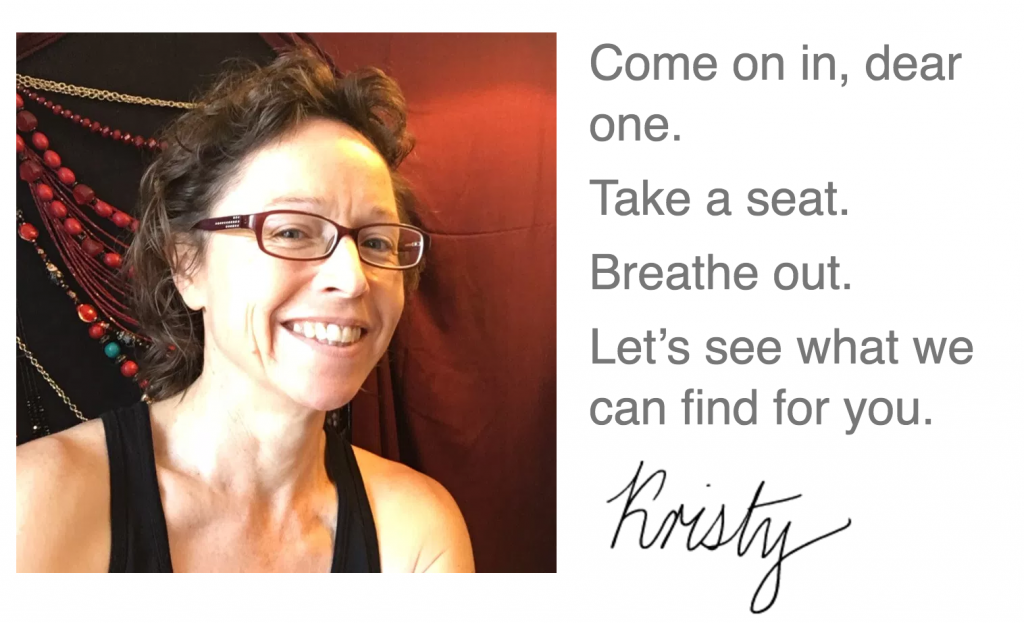
You are Australian living in the US. What was it like to grow up in Australia, did you see a lot of kangaroos and crocodiles when you were little?
Thank you for inviting me, Natalia.
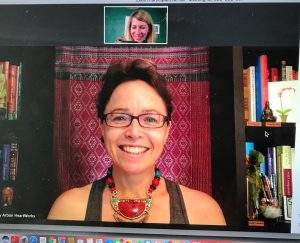
I have to admit that the first time I saw a crocodile was when I got to visit Australia with my American husband back in my thirties. We were in a very touristic place.
But I did see kangaroos from quite young, they are not as uncommon to see.
Can you tell me about where you grew up?
I grew up on a family farm on Yorke Peninsula, in South Australia.
My family grew wheat, barley, oat, peas, soy, all sorts of crops. We had cows, pigs, sheep, quite a lot of animals on the farm.
I started working very young. I believe it helped me out in my adult life:
I am hard-working because that is how I learned it.
Now I know that I was fortunate to grow up on the farm. I was able to be in nature; I loved looking at those skies, peaceful and quiet at night, all of that was lovely. My connection with animals was really nurtured. A lot of what we did on the farm was fun. For that I feel grateful.
What were your chores?
I did not have any specific chores. I did things together with the others. Sometimes, I took care of the sheep. I gave them medicine.
How would you describe your younger self? Were you a happy child?
I remember riding on the back of the truck when I was a child, wind in my hair, that was a very happy moment.
But while I seemed happy on the outside, I certainly had some struggles as a child. I was prone to the inner critic and to shame quite young.
How did your critical inner voice and the feeling of shame start developing?
I developed that inner critic quite young. I knew that if I did well, my parents would love me.
I learned that when I did well at school, my parents would notice me and would show me their love and appreciation, so I developed a bit of perfectionism.
My radar was always looking where I could do things that would help me to show what a good girl I was. Eating vegetables, doing well in school, anything.
I wanted to be a “good girl”. This sort of belief in the “good girl” is cultural as well.
Of course, my parents loved me but deep inside, I needed “real” signs, a “real” confirmation that I was loved.
Who was your female role model if you had any?
My favorite aunt! She is still alive, her name is Auntie Rosemarie.
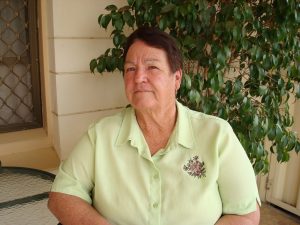
Auntie Rosemarie is the epitome of what I think of as Earth mother.
She is very warm, very welcoming, very loving, and very non-judgemental.
She had a large house, and her kitchen was packed with cutlery, magazines, all possible signs of humanity, and there were always people in it.
Going to her place for tea and sweet biscuits were one of the highlights of my childhood. We would sit there with a cup of tea and cookies listening to adults talking about the family, the crops, the weather, the neighbors.
I felt at home, and I felt loved. What a wonderful feeling of belonging it was!
There were those happy places in your childhood. What about the school, did you have a favorite subject in school?
I enjoyed English. I liked creative writing, prose, poetry, exploring 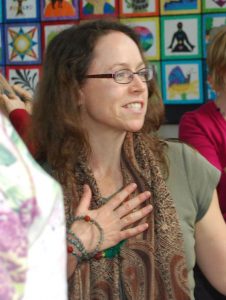 texts. I had a favorite teacher who was supportive of my English. He saw the creativity in me and encouraged me in my writing.
texts. I had a favorite teacher who was supportive of my English. He saw the creativity in me and encouraged me in my writing.
I am still writing a lot. It is the way I express my creativity.
Did your English teacher inspire you?
My English teacher showed faith in me. He was excited about my potential.
I believe if we can have one or two people in childhood who are genuinely excited about us and genuinely have unconditional love for us, that can go a long way in helping us evolving being an authentic human being.
I know that you worked as an Ambulance Transfer Officer at some point after your studies. How did it happen?
I had quite a variety of jobs after I finished my studies, including my main full-time job, working for the Child Support Agency in the Australian government, where I was helping custodian parents to get finances or resolve conflicts.
At some point, I also was working on an organic farm.
But yes, one of my dreams was to become an Ambulance officer, so I applied for a job as an Ambulance Transfer Officer for the South Australia Ambulance Association.
Did you dream of driving the ambulance when you were a little girl?
I did not have a strong dream when I was little, but I have always wanted to feel useful, to be making a difference in the community.
I once did a vocational test to work out what I could be when I became an adult. That test recommended me to become a social worker or a nun, could you believe it?!
As the Ambulance Transfer Officer, I had to transfer patients  from a hospital to a nursing home, or from a nursing home to a hospital.
from a hospital to a nursing home, or from a nursing home to a hospital.
Sometimes I had to lift their bodies. There was a lot of care required in that. I did some training on how to do it safely, and I also had to be fit.
I only had that job for a couple of years, and it was a part-time job, but I think quite fondly about it.
My office job did not nurture me any longer. I enjoyed feeling like I was making a difference.
Besides, I like uniforms, and that one was very green. I loved it!
A social worker or a nun, the results of your vocational test are quite close.
As it worked out, my life has got to have these two aspects – I have a strong spiritual practice, and I certainly do a lot of work of helping people out, which is what social workers are doing.
Kristy Arbon on Buddhism
How did you discover Buddhism?
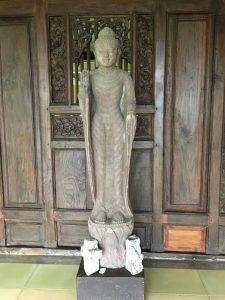 I was brought up as a very devoted Christian. I used to go to church with my grandparents, and I liked this connection with a Being much larger and more amazing than myself. I developed a close relationship to God, to Jesus.
I was brought up as a very devoted Christian. I used to go to church with my grandparents, and I liked this connection with a Being much larger and more amazing than myself. I developed a close relationship to God, to Jesus.
Later in my teenage years, I got skeptical and disillusioned by the Church, so I started moving away.
What influenced your attitude toward the Church?
The confusion that came from the realization that Christians could behave unethically. Some things I learned about the Church didn’t fit with how I felt about life.
How did you get to practice Buddhism?
I was in my twenties, and I experimented. I tried out Thích Nhất Hạnh’s kind of Buddhism, some Zen Buddhism, some Tibetan Buddhism, Vipassana meditations.
I also dwelled a bit into Wicca. Do you know Wicca?
No.
It is an Earth-based spirituality, using rituals that connect us to Earth, to the plants, animals.
It is the descendant of Celtic paganism. Some of my ancestors were Celtic. I felt I was sort of returning to my Celtic roots.
Why did you keep practicing Buddhism?
I was fascinated by Thích Nhất Hạnh’s book “The Miracle of Mindfulness.” Some call it a manual on meditation. He talks about the value of slowing down and doing things very mindfully.
One morning, I decided to spend my whole morning moving slowly to be aware of my actions. You could think from the outside that I was doing nothing, except moving slowly for 4 hours. I got very little done, but I felt the gravity of slowing right down and being with my experience.
It was an important part of my Buddhist practice. It stays with me to this day.
When I came to the States in my mid-thirties, I continued practicing and learning. I got a job at the Barre Centre for Buddhist Studies.
At the time, it was run by Andrew Olendzki, probably one of the world’s best-known scholars in the Pali texts, which are the original language that Buddhism was taught in. I got to learn a lot from him. My husband and I went there for five years.
Is your husband a Buddhist too?
Neither my husband nor I call ourselves Buddhists, but we practice and understand the world from a Buddhist perspective.
He and I have supported each other in the practice of Mindfulness and Meditation. We practice and work a lot together.
Kristy Arbon on Meditation Practice
How much time do you meditate every day?
I don’t have a formal practice of sitting every day.
Sometimes, I have a daily meditation practice, but I don’t force myself to sit anymore.
I don’t force myself to do anything these days.
I have a growing self-compassion practice. I sit when I feel that it is something I like to do.
It is a responsive, informal practice that might be likened to what we call an open awareness meditation.
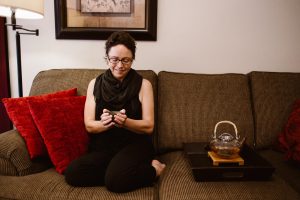 I am mindful as much as I can every moment of what is happening for me, what my emotions are, what my body is feeling. I respond to that as skilfully as I can.
I am mindful as much as I can every moment of what is happening for me, what my emotions are, what my body is feeling. I respond to that as skilfully as I can.
I am permitting myself not to feel that I should be doing practice in a particular way. Practicing is all about being curious. It’s about self-inquiry. It’s about learning what we need and responding to that.
“Your wisdom is in your own body.”
What is Self-Compassion and why is it important
Is it what you teach in your HeartWorks online courses?
I help people to develop their spiritual practice.
I teach Mindfulness and Self-Compassion online, as you know, Natalia, that’s how we got to know each other.
I am grateful for this. You helped me understand the importance of not being hard on yourself. Tell me more about what you do.
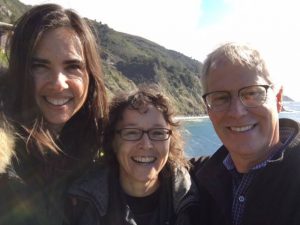
The ten weeks Mindful Self-Compassion course that you took, was developed by Chris Germer and Dr. Kristin Neff.
I also offer group workshops. It’s a joy to meet people from all over the world and help them.
I also do one-to-one mentoring. We meet online and chat once or twice a month. I keep regular email contact with my international clients.
What Self-Compassion and Mindfulness workshops do you offer offline?

I offer shorter workshops. One of them is a secular workshop exploring the archetype of Our Lady of Guadalupe.
Our Lady of Guadalupe is believed to appear to offer hope for a community that feels oppressed and disenfranchised. It is very relevant for us today. So many groups in our society do not have a voice. We need to make sure everyone feels seen and heard.
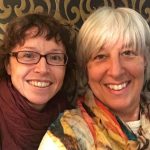
I also organize retreats for women. For example, in the course “Nurturing Your Spiritual Center” that I developed with my colleague Karen Grayson, we invite women on a self-discovery adventure to discover their unique core values and connect through spiritual practices.
Sometimes, I compare myself to a midwife. I like to midwife women into finding their true self through using a spiritual practice that is very authentic, very round, very connecting.
Are meditation courses female-dominated?
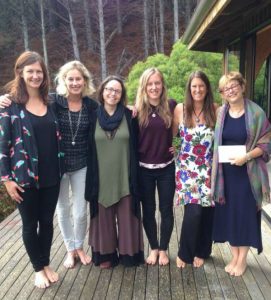
It depends on the tradition. There’re more feminine ways of practicing and more masculine ways of practicing.
I am teaching to listen to your body and give yourself a break if you are feeling you are giving yourself a hard time, to forget dogma.
Feeling the body is a more feminine quality. Many women might be attracted to the Mindfulness methods that are not too strict.
But you might find more men in more disciplined, maybe dogmatic ways of practice, when you have to push the boundaries and are practicing despite your body.
Mindfulness, Self-Compassion and Success
How does the teacher of Mindful Self-Compassion in you define success?
Success for me is about being in tune with my body, asking myself what I need, and assessing the information I get from the body.
It is about constantly being in touch with myself and responding from an authentic place.
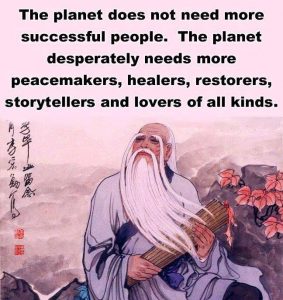
At a deeper level, it means being in touch with our core values, acknowledging them, and managing our lives in a way that aligns with them.
That is my measure of success, and that’s what I teach other people.
When you think of the word ‘successful’, who is the first person that comes to mind and why?
I think of two of my teachers, Kristin Neff, leading self-compassion researcher and Brené Brown, shame-and-vulnerability expert.
They turned the personal things that matter to them into professional work, and they follow their heart in that sense. For Brené Brown, it’s been shame-resilience, and Kristin Neff has been working on self-compassion.
I would also love to mention Michelle Stransky, a woman who has started an organization called WisdomWomen, here in the States.
She is experimenting with feminine ways of running an organization. No boss on the top has the power to make ultimate decisions. Instead it’s about the collaboration of a group of peers, when everyone is feeling into a situation, working out together how to make their mission and vision happen and where to go next.
It’s a beautiful organization, and it’s continuing to evolve.
Do you consider yourself successful?
I feel successful because I am exactly where I am meant to be at this point in my life.
I am getting towards fifty. I feel that women in their 40s and 50s often become much more comfortable in their skin – we are worrying less what other people think about us, we are more tuned to what we need and what we do not need.
I think my age might be helping me to feel more successful.
Can meditation for self-compassion help us to be successful?
Having a meditation practice can help to calm our Mind, so we are in a better state to make the right decisions about ourselves. And good decisions help us work toward success.
That is how it works.
What’s your advice on how to find what self-compassion and mindfulness practice works for us?
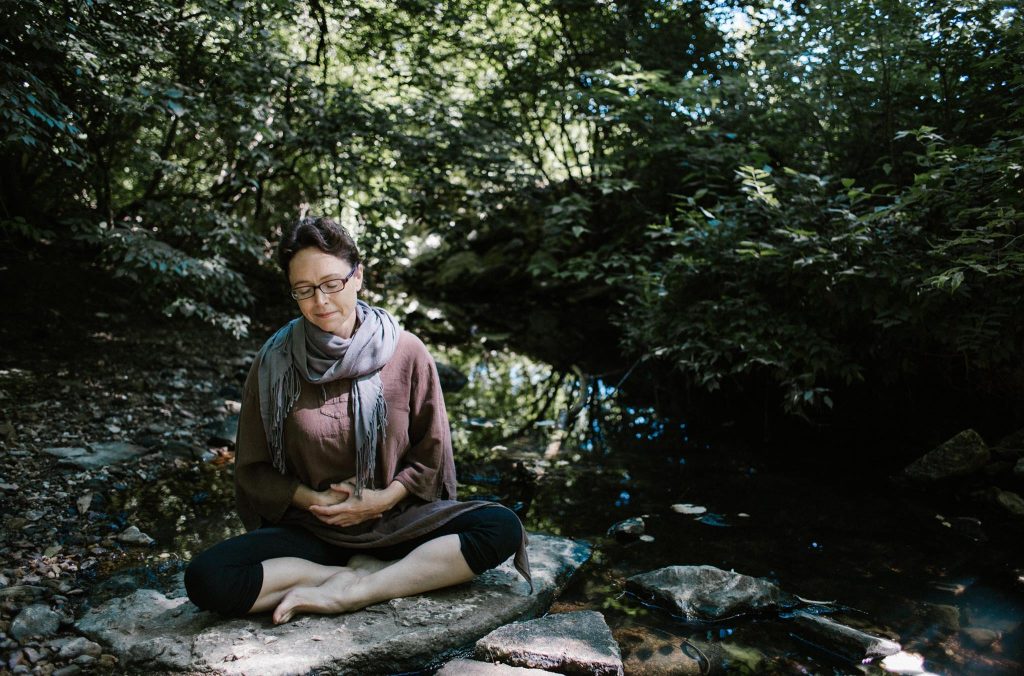 These things are very personal to us. There are so many different ways of practicing Self-Compassion and Mindfulness. It does not have to be something exotic and special.
These things are very personal to us. There are so many different ways of practicing Self-Compassion and Mindfulness. It does not have to be something exotic and special.
Some people feel a deeper connection to themselves when they are in nature. It is a beautiful spiritual practice.
A client of mine told me how she enjoys having dinner with her husband. They hold hands when they have dinner, and they talk about their day.
That is a beautiful practice of witnessing each other, listening kindly, patiently, compassionately, and lovingly to your partner.
If you have something like that, treat it as a practice.
How to find your Mindfulness and Self-Compassion practice:
Do some research, learn what is viable for you, think what nurtures you, and find sacredness in what you are already doing. I think we need to permit ourselves to experiment.
A Self-Compassion Teacher’s daily routine
What do the first 60-90 minutes of your day look like?
They probably don’t look the way people may think they look.
I slowly wake up. I lie there for a moment. I notice how I am feeling. I listen to the noises, maybe to the birds outside.
If I wake up agitated, I calm myself a bit, I intentionally give myself a hug, or snuggle to my pillow or my bedding.
I have very luxurious bedding. It’s a self-compassion practice.
It feels like I am in a bunch of furs. It’s just very nurturing, so I stay there for as long as I need and wait until I feel it is ok to get out.
After getting out, I should make a cup of coffee. I usually come straight to my computer with my cup of coffee. I check my emails, this is my way to connect with other people, and I look to see the things to do today.
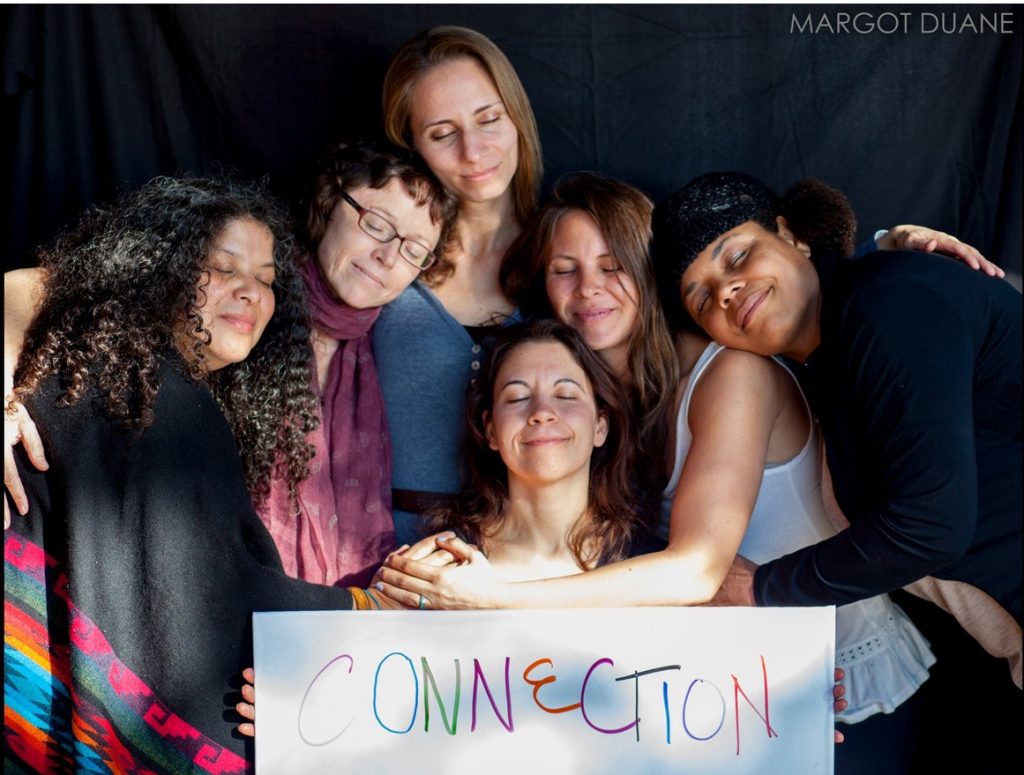
I am not interested in the news. I don’t watch or read it. My news is what connections have happened, what new connections or the old ones I can nurture today.
And that is my favorite part of the day: sitting with my coffee, checking what Kristy’s news today.
Do you have anything for breakfast with your coffee?
I eat when I am hungry. I am not hungry first thing in the morning, so I might eat at 10 or 11, and I eat very small meals.
But one of the fun things I love to do at the end of the day is to watch my favorite television show and eat!
I had to find the healthiest food that I could eat a lot, so I steam a big plate of vegetables, salt over them, and I just eat that, and then a big plate of fruit.
Sometimes I eat popcorn as well. I put a bit of maple syrup on it. That’s my evening.
In moments of procrastination, if they ever happen to you, how do you build yourself back up?
I have changed my lifestyle so that I have enough space to do things that I need to do in my day.
I think we sometimes procrastinate because we have too many things to do.
What’s next for you?
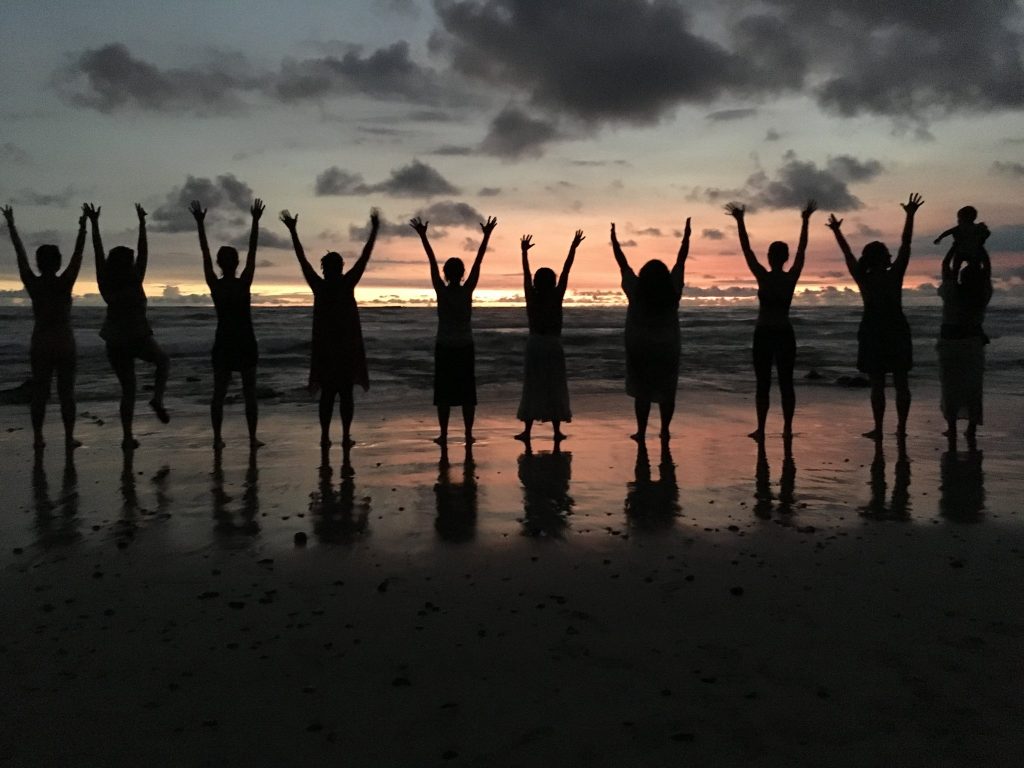 At the moment, I am building my Mindfulness and Self-Compassion consulting business. I am mentoring my clients, working on my partnerships.
At the moment, I am building my Mindfulness and Self-Compassion consulting business. I am mentoring my clients, working on my partnerships.
I am co-operating on a couple of meditation apps, working with some people in academics, and enjoying waiting to see what comes next to me.
But I also have a couple of big dreams. I quite like to write a book, and as part of that, I might do a TEDx Talk.
I am looking forward to it. Kristy, thank you for this interview.
Useful links, addresses, and notes
Connect to Kristy Arbon:
- Kristy Arbon’s HeartWorks
- HeartWorks Facebook Page
- Instagram: @KristyArbon
- Kristy Arbon’s Free Guided Meditations
Organizations:
- Center for Mindful Self-Compassion in San Diego, California
- Barre Centre for Buddhist Studies
- WisdomWomen
People:
- Thích Nhất Hạnh
- Andrew Olendzki
- Chris Germer
- Kristin Neff
- Karen Grayson
- Brené Brown
- Michelle Stransky
Notions, Practices:
- Self-Compassion
- Mindfulness
- Earth Mother
- Our Lady of Guadalupe
- Zen Buddhism
- Tibetan Buddhism
- Vipassana meditations
- Wicca
- Pali Canon
- Buddhism
Books and Apps:
Images: Courtesy of Kristy Arbon